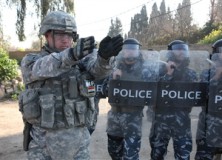“Improvising Furiously:” The Effort to Train Iraq’s Police — Thomas Dybicz

INTRODUCTION:
Training an indigenous police force has been one of the seminal challenges of the Iraq War. The success of the police-training mission in Iraq is of critical importance as a competent, humane police force—dedicated to protecting the citizen’s person and rights—is essential for the establishment of a viable democracy. However, in the absence of coherent pre-war planning and reliable intelligence, the United States has conducted the training mission, with the support of its coalition partners, in an almost entirely ad hoc manner. As with so many other aspects of the war, the burden of police training has fallen to the U.S. military. While the U.S. armed forces’ ability to adapt to new and challenging tasks is impressive and encouraging, the necessity of the military’s involvement speaks to shortcomings on the part of other federal agencies and departments.
STRATEGY:
A preponderance of U.S. war planners were decidedly optimistic in their expectations for post-conflict Iraq, assuming that Saddam’s Iraq would fall as a fully functioning state with its institutions intact. Under such presumptions, limited police training would be needed. Three weeks before the invasion, General Jay Garner, head of Office of Reconstruction and Humanitarian Affairs (ORHA), met with senior National Security Council (NSC) officials. At the meeting, he unveiled a detailed plan for police training that had been developed by Richard Mayer, a Department of Justice (DOJ) affiliated member of ORHA. Mayer’s plan called for 5,000 American and foreign advisers to help train Iraq’s police. NSC officials preferred a lighter footprint in line with post-war assumptions and the Mayer plan was not executed. Ad hoc planning became the mainstay of strategy: The U.S. approach was in constant flux as trainers attempted to make up for past mistakes and resource shortcomings.
INTEGRATED ELEMENTS OF NATIONAL POWER:
Since the United States did not have a large training capacity in either the Department of State (DOS) or DOJ, various contracts were issued to provide civilian law enforcement training and mentoring of Iraqi police. However, given the poor security situation, the U.S. government had difficulty hiring enough International Police Liaison Officers (IPLO). This provoked a change in U.S. strategy, iterated in National Security Presidential Directive 36 which was issued on May 11, 2004. The directive vested responsibility for the training of all Iraqi security forces to the Department of Defense (DOD), though DOS was to be tasked with control at an undetermined future point. Thus, U.S. soldiers and Marines administered ad hoc training. While considerable improvements have been made in police training, there are still not enough or IPLOs to cover all of Iraq’s needs.
EVALUATION:
In the planning stages of the war, there was a lack of cooperation between U.S. agencies. The Office of the Secretary of Defense (OSD) consistently prevented Pentagon representatives from attending CIA exercises regarding the “day after” Saddam’s fall, for example. In the midst of interagency disconnects, post-war possibilities for Iraq were not given sufficient consideration. The resultant ad hoc operations contributed to inefficiency in the police training process. In addition, DOS and DOJ exhibited difficulty projecting a strong presence in the unstable environment of post-war Iraq. Reliance on contractors severely limited these two agencies’ capacity for operating effectively in dangerous or unstable environments. Due to simple necessity, the DOD with its vast resources has come to dominate contributions to police training. The military’s ability to adapt to this expanded and unfamiliar mission has been impressive, even if it has resulted in training that leans more toward counterinsurgent capabilities than community policing.
RESULTS:
The first month of any nation building effort is the most important. Unfortunately, the coalition’s decision to turn a blind eye to looting and to take its time starting the police training mission laid a poor foundation in Iraq. Since then, U.S. missteps and failures in police training, often excused because of the unstable security situation in Iraq, fed instability. Ad hoc decision making has been cumbersome at times and outright injurious at others. While some progress has been made, training remains slow and far below required levels.
CONCLUSION:
An understanding of the long and circuitous route that the United States has taken in training Iraqi police yields important lessons for national security policy in future nation-building environments. Effective and humane policing is essential to the vitality of the new Iraq. However, the U.S. training mission has been almost entirely ad hoc. Incomplete post-war plans and civilian capacity shortfalls led the U.S. military to assume the responsibility of training, further taxing its already strained resources.